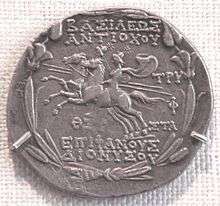Antiochus VII Sidetes
| Antiochus VII Euergetes | |
|---|---|
| Antiochus VII Sidetes | |
.jpg) | |
| King of the Seleucid Empire (King of Syria) | |
| Reign | 138–129 BC |
| Predecessor | Diodotus Tryphon |
| Successor |
Alexander II Zabinas (false son) Demetrius II Nicator (elder brother) |
| Born | Unknown |
| Died |
129 BC Ecbatana, Iran during the Battle of Ecbatana |
| Consort | Cleopatra Thea |
| Issue | Antiochus IX Cyzicenus |
| Dynasty | Seleucid dynasty |
| Father | Demetrius I Soter |
| Mother | possibly Laodice V |
Antiochus VII Euergetes, nicknamed Sidetes (from Side, a city in Asia Minor), ruler of the Hellenistic Seleucid Empire, reigned from 138 to 129 BC. He was the last Seleucid king of any stature. After Antiochus VII Sidetes was killed in battle, the Seleucid realm was restricted to Syria.
Biography
Early life and early reign
He was one of the sons of Demetrius I Soter, the brother of Demetrius II Nicator and his mother may have been Laodice V. Antiochus was elevated after Demetrius' capture by the Parthians. He married Cleopatra Thea, who had been the wife of Demetrius. Their offspring was Antiochus IX, who thus became both half-brother and cousin to Seleucus V and Antiochus VIII.

Sidetes defeated the usurper Tryphon at Dora[1] and laid siege to Jerusalem in 132. During the siege he allowed a seven-day truce for the Jews to celebrate a religious festival, impressing the Jewish leadership.[2] According to Josephus[3] the Hasmonean leader John Hyrcanus opened King David's sepulchre and removed three thousand talents, which he then paid Antiochus to spare the city. Nevertheless, King Antiochus' respectful treatment of the Jews, and respect for their religion, earned him their gratitude and added name Euergetes ("the Benefactor"). With no Jewish sources of that time (the Book of Maccabees ends few years before his time), it is unclear if the siege of Jerusalem ended with a decisive Seleucid victory or simply a peace treaty. Furthermore, Jewish forces later assisted Sidetes in his wars, and for nearly 20 years after his death, John Hyrcanus refrained of attacking areas under Seleucid control. All in all it indicates a renewal of the friendly relations from the time of Demetrius II.
Later territory disputes and defeat
Antiochus spent the final years of his life attempting to reclaim the lost eastern territories, overrun by the Parthians under their "Great King", Mithridates I. Marching east, with what would prove to be the last great Seleucid royal army (including a unit of Judean troops under John Hyrcanus), he defeated Mithridates in two battles, killing the aged Parthian king in the last of these. He restored Mesopotamia, Babylonia and Media to the Seleucid empire, before dispersing his army into winter quarters.
The Seleucid king and army spent the winter feasting, hunting, and drinking (the Seleucids maintained the Macedonian tradition of heavy drinking). As with any time an army is quartered upon a population, tensions soon grew between the locals and the Syrian troops.
The new Parthian ruler, Phraates II, had not been idle; raising a new army while stirring up rebellion in the Seleucid occupied towns of Media. Hoping to further sow dissension amongst his foes, Phraates also released his long-held prisoner, Demetrius II, Antiochus' older brother, to return to Syria and reclaim the throne.
That winter (130–129 BCE), several Median towns rose in rebellion and attacked their Seleucid garrisons. Antiochus marched to support one such isolated garrison with only a small force (probably only his Royal Guards). In a barren valley, he was ambushed and killed by Phraates II and a large force of Parthians, which had entered the country without being detected. After the battle the Parthians told the people that Sidetes killed himself because of fear, but the last great Seleucid king died in battle, a fitting end for the heir of Seleucus I Nicator (the Victor).
After Antiochus VII Sidetes, the Parthians regained the just lost Mesopotamia and released the former Seleucid King Demetrius II Nicator. Under Demetrius II Nicator the Seleucid Dynastic Wars began and the Seleucid Empire should be restricted to only Syrian Lands.
See also
References
External links
- Antiochus VII Sidetes entry in historical sourcebook by Mahlon H. Smith
| Antiochus VII Sidetes Born: Unknown Died: 129 BC | ||
| Preceded by Diodotus Tryphon |
Seleucid King (King of Syria) 138–129 BC |
Succeeded by Demetrius II Nicator and Alexander II Zabinas |